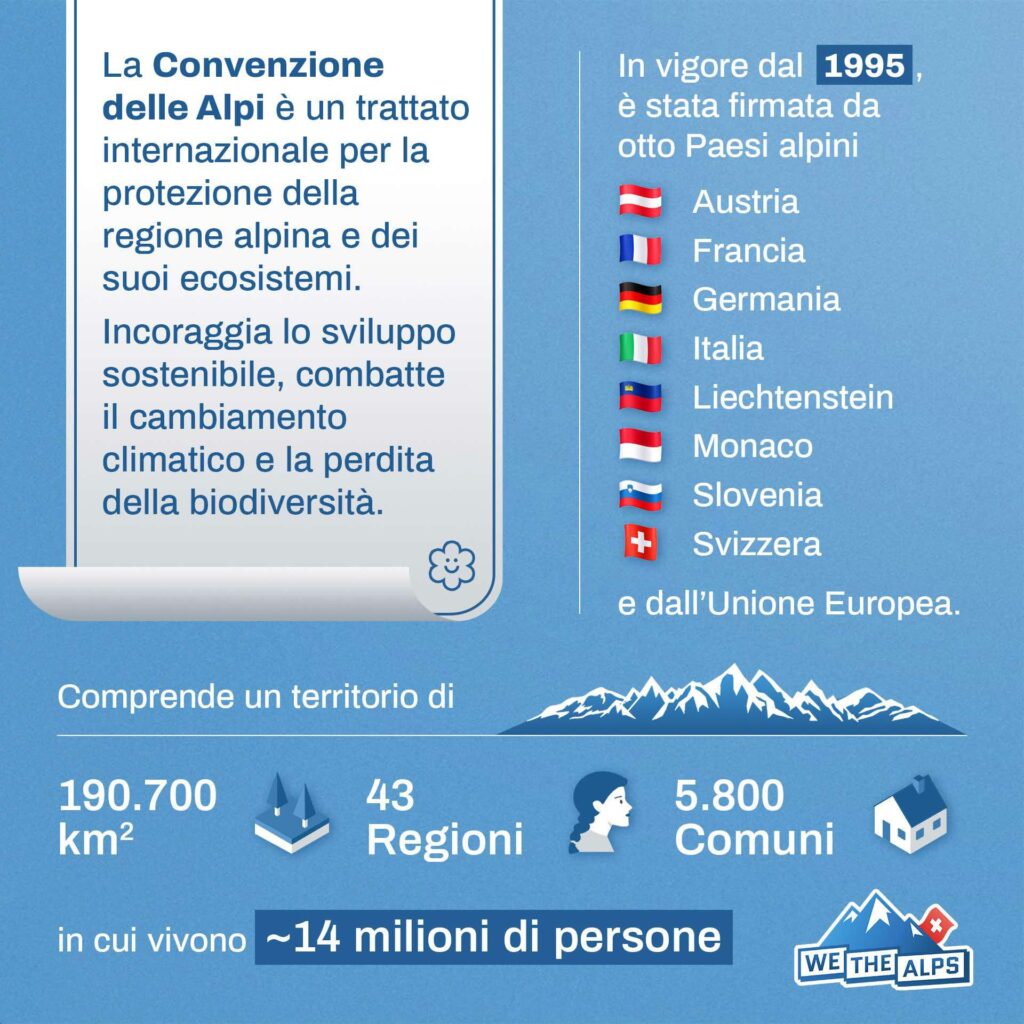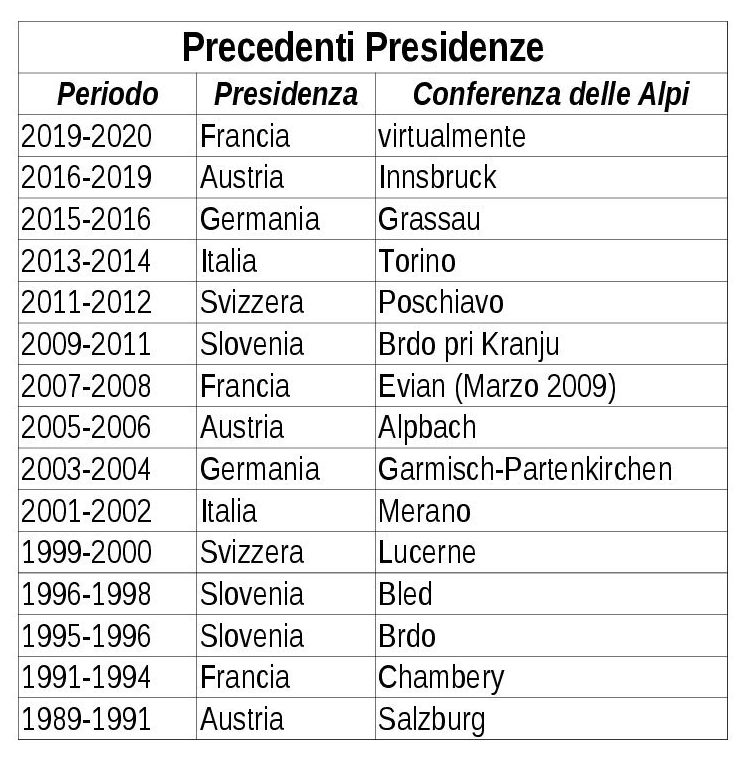Alpine Convention
The Alpine Convention was the first international treaty in the world to consider a mountain area transnational in its entire geographical area
This agreement was signed by eight Alpine countries: Austria, France, Germany, Italy, Switzerland, Liechtenstein, Slovenia and Monaco, as well as by the European Union. It came into force in 1995 and aims at the protection and sustainable development of the Alps.This mountainous area in the heart of Europe is the natural, cultural, living and economic environment for more than 14 million people and a large number of visitors each year.
Meetings of the Alpine Conference are held every two years in the country holding the presidency (usually one country holds the presidency for two years).
The official languages of the Alpine Conference are French, German, Italian and Slovenian.
The United Nations, its specialised agencies, the Council of Europe and all European countries can participate in the meetings as observers.
The same applies to cross-border associations of Alpine territorial authorities. Relevant non-governmental organisations can also be admitted as Observers. Decisions are taken on a consensual basis.

A bit of history
Already in 1952, CIPRA (International Commission for the Protection of the Alps) had as its objective the elaboration of a convention among the Alpine countries.
On May 17, 1988 the European Parliament in plenary session approved a resolution for the elaboration of a “Convention on the Protection of the Alpine Region”.
In 1989, at the first Alpine Conference in Berchtesgaden (Germany), the Ministers of the Environment drew up a document containing 89 points, which marked a concrete commitment to the formulation of a binding international treaty between the eight Alpine states and the EEC.
The Alpine Convention was completed and signed in Salzburg (Austria) on 7 November 1991 by Austria, France, Germany, Italy, Liechtenstein, Switzerland and the EEC. Slovenia signed this treaty in 1993 and Monaco in 1994 on the basis of a separate additional protocol.
The Alpine Convention entered into force in 1995.
The aim of the Alpine Convention is to safeguard the sensitive Alpine ecosystems, together with the regional cultural identities, heritage and traditions of the Alps for future generations.

Protocols and Declarations
The Protocols contain specific measures for the implementation of the principles of the Framework Convention and concrete steps to be taken for the protection and sustainable development of the Alps.
The Alpine countries undertake to adopt specific measures in 12 thematic areas (population and culture, spatial planning, air quality, soil protection, water, nature and landscape protection, mountain agriculture, mountain forests, tourism, transport, energy and waste).
Two additional protocols were also approved, respectively the Protocol on Dispute Settlement and the Protocol of accession of the Principality of Monaco to the Alpine Convention.
For further information you can view the documents on the site: https://www.alpconv.org/en/home/convention/protocols-declarations/
The Presidency of the Alpine Convention
Switzerland, with Federal Councillor Simonetta Sommaruga as President, has assumed the Presidency of the Alpine Convention for the two-year period 2021-2022, succeeding France.
During its two-year presidency, Switzerland is committed to pursuing the following three thematic priorities: climate, which will also serve as a guiding principle, sustainable transport and Alpine cities.
With the Alpine System of Climate Targets 2050 and Climate Action Plan 2.0, the Alpine Convention has set itself the goal of making the Alps a climate-neutral and climate-resilient area. Switzerland wants to contribute to the achievement of this goal and is planning various projects to this end.The mobility and capacity requirements of transport networks are high in the Alps, which are at the same time a very sensitive natural environment. In order to minimize environmental impact, Switzerland is committed to making transport more resource-friendly and to increasing sensitivity to the natural characteristics of the Alps.
Finally, Switzerland wishes to set new priorities in Alpine urban spaces, addressing environmental and social issues. Switzerland promotes sustainable renovation and construction in the Alps and demonstrates that Alpine cities can adapt to climate change through spatial planning measures.
Within the framework of the three thematic priorities, Switzerland will implement a five-point plan during its presidency: cycle tourism, Climate Hour, sustainable renovation and construction in the Alps, Alpine cities, and transalpine rail freight transfer policy.
In the years 2021 – 2022 many events and projects will be organized that will bring together the actors of the Alpine space. In this context, the active involvement of young people in the various projects will be a key element for the Swiss Presidency.
- Bicycle tourism: the first event took place on April 22, 2021, with the international conference “MoVe the Alps”. During the conference, participants discussed how to promote sustainable and climate-friendly cycle tourism in the Alpine region. During the summer, the 2021 edition of YOALIN will be held, where sustainable mobility by bike, train and foot will play a central role.
- Climate Hour: On June 5, 2021, World Environment Day, Switzerland launched the Climate Hour initiative. The aim of this decentralized event was to show the variety of small and large-scale climate events in the Alpine region.
- Sustainable Renovation and Construction in the Alpine Space: as part of the 10th anniversary of the Constructive Alps International Architecture Prize, a conference on this topic was organized on June 10, 2021.
- Alpine cities: The IXth Report on the State of the Alps will focus on the topic of Alpine cities. Alpine urban spaces will be highlighted for the first time and the climatic, environmental and social challenges they face will be jointly examined and discussed. Together with the Alpine Towns and other partners, Switzerland is also launching the “Climate Action in Alpine Towns” project, which involves the local population in promoting climate-friendly measures. A peer learning workshop on the topic of climate action in Alpine towns took place on June 18, 2021.
- Transfer policy: The Swiss Presidency intends to improve coordination between the Alpine states in the area of transit traffic and road-rail transfer, which is an essential pillar of a sustainable transport policy. The intention is to create a forum for discussion among the states on climate and transport objectives.
Switzerland is also leading the participatory elaboration of the new Multiannual Work Programme of the Alpine Convention for the period 2023 – 2030.

To learn more about this organization and discover its activities you can visit their website https://www.alpconv.org/ available in Italian, German, French, English and Slovenian.





